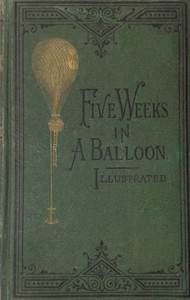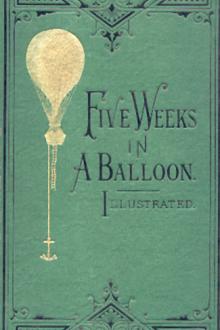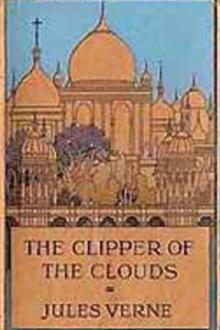Five Weeks in a Balloon<br />Or, Journeys and Discoveries in Africa by Three Englishmen, Jules Verne [english novels to read txt] 📗

- Author: Jules Verne
Book online «Five Weeks in a Balloon<br />Or, Journeys and Discoveries in Africa by Three Englishmen, Jules Verne [english novels to read txt] 📗». Author Jules Verne
“Let us escape to the ground!” shouted Kennedy, “it is our only chance of safety!”
But Ferguson checked him with a firm grasp, and, dashing at the anchor-rope, severed it with one well-directed blow of his hatchet. Meanwhile, the flames, leaping up at the balloon, already quivered on its illuminated sides; but the Victoria, released from her fastenings, spun upward a thousand feet into the air.
Frightful yells resounded through the forest, along with the report of fire-arms, while the balloon, caught in a current of air that rose with the dawn of day, was borne to the westward.
It was now four o’clock in the morning.
The Talabas.—The Pursuit.—A Devastated Country.—The Wind begins to fall.—The Victoria sinks.—The last of the Provisions.—The Leaps of the Balloon.—A Defence with Fire-arms.—The Wind freshens.—The Senegal River.—The Cataracts of Gouina.—The Hot Air.—The Passage of the River.
“Had we not taken the precaution to lighten the balloon yesterday evening, we should have been lost beyond redemption,” said the doctor, after a long silence.
“See what’s gained by doing things at the right time!” replied Joe. “One gets out of scrapes then, and nothing is more natural.”
“We are not out of danger yet,” said the doctor.
“What do you still apprehend?” queried Kennedy. “The balloon can’t descend without your permission, and even were it to do so—”
“Were it to do so, Dick? Look!”
They had just passed the borders of the forest, and the three friends could see some thirty mounted men clad in broad pantaloons and the floating bournouses. They were armed, some with lances, and others with long muskets, and they were following, on their quick, fiery little steeds, the direction of the balloon, which was moving at only moderate speed.
When they caught sight of the aëronauts, they uttered savage cries, and brandished their weapons. Anger and menace could be read upon their swarthy faces, made more ferocious by thin but bristling beards. Meanwhile they galloped along without difficulty over the low levels and gentle declivities that lead down to the Senegal.
“It is, indeed, they!” said the doctor; “the cruel Talabas! the ferocious marabouts of Al-Hadji! I would rather find myself in the middle of the forest encircled by wild beasts than fall into the hands of these banditti.”
“They haven’t a very obliging look!” assented Kennedy; “and they are rough, stalwart fellows.”
“Happily those brutes can’t fly,” remarked Joe; “and that’s something.”
“See,” said Ferguson, “those villages in ruins, those huts burned down—that is their work! Where vast stretches of cultivated land were once seen, they have brought barrenness and devastation.”
“At all events, however,” interposed Kennedy, “they can’t overtake us; and, if we succeed in putting the river between us and them, we are safe.”
“Perfectly, Dick,” replied Ferguson; “but we must not fall to the ground!” and, as he said this, he glanced at the barometer.
“In any case, Joe,” added Kennedy, “it would do us no harm to look to our fire-arms.”
“No harm in the world, Mr. Dick! We are lucky that we didn’t scatter them along the road.”
“My rifle!” said the sportsman. “I hope that I shall never be separated from it!”
And so saying, Kennedy loaded the pet piece with the greatest care, for he had plenty of powder and ball remaining.
“At what height are we?” he asked the doctor.
“About seven hundred and fifty feet; but we no longer have the power of seeking favorable currents, either going up or coming down. We are at the mercy of the balloon!”
“That is vexatious!” rejoined Kennedy. “The wind is poor; but if we had come across a hurricane like some of those we met before, these vile brigands would have been out of sight long ago.”
“The rascals follow us at their leisure,” said Joe. “They’re only at a short gallop. Quite a nice little ride!”
“If we were within range,” sighed the sportsman, “I should amuse myself with dismounting a few of them.”
“Exactly,” said the doctor; “but then they would have you within range also, and our balloon would offer only too plain a target to the bullets from their long guns; and, if they were to make a hole in it, I leave you to judge what our situation would be!”
The pursuit of the Talabas continued all morning; and by eleven o’clock the aëronauts had made scarcely fifteen miles to the westward.
The doctor was anxiously watching for the least cloud on the horizon. He feared, above all things, a change in the atmosphere. Should he be thrown back toward the Niger, what would become of him? Besides, he remarked that the balloon tended to fall considerably. Since the start, he had already lost more than three hundred feet, and the Senegal must be about a dozen miles distant. At his present rate of speed, he could count upon travelling only three hours longer.
At this moment his attention was attracted by fresh cries. The Talabas appeared to be much excited, and were spurring their horses.
The doctor consulted his barometer, and at once discovered the cause of these symptoms.
“Are we descending?” asked Kennedy.
“Yes!” replied the doctor.
“The mischief!” thought Joe
In the lapse of fifteen minutes the Victoria was only one hundred and fifty feet above the ground; but the wind was much stronger than before.
The Talabas checked their horses, and soon a volley of musketry pealed out on the air.
“Too far, you fools!” bawled Joe. “I think it would be well to keep those scamps at a distance.”
And, as he spoke, he aimed at one of the horsemen who was farthest to the front, and fired. The Talaba fell headlong, and, his companions halting for a moment, the balloon gained upon them.
“They are prudent!” said Kennedy.
“Because they think that they are certain to take us,” replied the doctor; “and, they will succeed if we descend much farther. We must, absolutely, get higher into the air.”
“What can we throw out?” asked Joe.
“All that remains of our stock of pemmican; that will be thirty pounds less weight to carry.”
“Out it goes, sir!” said Joe, obeying orders.
The car, which was now almost touching the ground, rose again, amid the cries of the Talabas; but, half an hour later, the balloon was again falling rapidly, because the gas was escaping through the pores of the covering.
Ere long the car was once more grazing the soil, and Al-Hadji’s black riders rushed toward it; but, as frequently happens in like cases, the balloon had scarcely touched the surface ere it rebounded, and only came down again a mile away.
“So we shall not escape!” said Kennedy, between his teeth.
“Throw out our reserved store of brandy, Joe,” cried the doctor; “our instruments, and every thing that has any weight, even to our last anchor, because go they must!”
Joe flung out the barometers and thermometers, but all that amounted to little; and the balloon, which had risen for an instant, fell again toward the ground.
The Talabas flew toward it, and at length were not more than two hundred paces away.
“Throw out the two fowling-pieces!” shouted Ferguson.
“Not without discharging them, at least,” responded the sportsman; and four shots in quick succession struck the thick of the advancing group of horsemen. Four Talabas fell, amid the frantic howls and imprecations of their comrades.
The Victoria ascended once more, and made some enormous leaps, like a huge gum-elastic ball, bounding and rebounding through the air. A strange sight it was to see these unfortunate men endeavoring to escape by those huge aërial strides, and seeming, like the giant Antaeus, to receive fresh strength every time they touched the earth. But this situation had to terminate. It was now nearly noon; the Victoria was getting empty and exhausted, and assuming a more and more elongated form every instant. Its outer covering was becoming flaccid, and floated loosely in the air, and the folds of the silk rustled and grated on each other.
“Heaven abandons us!” said Kennedy; “we have to fall!”
Joe made no answer. He kept looking intently at his master.
“No!” said the latter; “we have more than one hundred and fifty pounds yet to throw out.”
“What can it be, then?” said Kennedy, thinking that the doctor must be going mad.
“The car!” was his reply; “we can cling to the network. There we can hang on in the meshes until we reach the river. Quick! quick!”
And these daring men did not hesitate a moment to avail themselves of this last desperate means of escape. They clutched the network, as the doctor directed, and Joe, holding on by one hand, with the other cut the cords that suspended the car; and the latter dropped to the ground just as the balloon was sinking for the last time.
“Hurrah! hurrah!” shouted the brave fellow exultingly, as the Victoria, once more relieved, shot up again to a height of three hundred feet.
The Talabas spurred their horses, which now came tearing on at a furious gallop; but the balloon, falling in with a much more favorable wind, shot ahead of them, and was rapidly carried toward a hill that stretched across the horizon to the westward. This was a circumstance favorable to the aëronauts, because they could rise over the hill, while Al-Hadji’s horde had to diverge to the northward in order to pass this obstacle.
The three friends still clung to the network. They had been able to fasten it under their feet, where it had formed a sort of swinging pocket.
Suddenly, after they had crossed the hill, the doctor exclaimed: “The river! the river! the Senegal, my friends!”
And about two miles ahead of them, there was indeed the river rolling along its broad mass of water, while the farther bank, which was low and fertile, offered a sure refuge, and a place favorable for a descent.
“Another quarter of an hour,” said Ferguson, “and we are saved!”
But it was not to happen thus; the empty balloon descended slowly upon a tract almost entirely bare of vegetation. It was made up of long slopes and stony plains, a few bushes and some coarse grass, scorched by the sun.
The Victoria touched the ground several times, and rose again, but her rebound was diminishing in height and length. At the last one, it caught by the upper part of the network in the lofty branches of a baobab, the only tree that stood there, solitary and alone, in the midst of the waste.
“It’s all over,” said Kennedy.
“And at a hundred paces only from the river!” groaned Joe.
The three hapless aëronauts descended to the ground, and the doctor drew his companions toward the Senegal.
At this point the river sent forth a prolonged roaring; and when Ferguson reached its bank, he recognized the falls of Gouina. But not a boat, not a living creature was to be seen. With a breadth of two thousand feet, the Senegal precipitates itself for a height of one hundred and fifty, with a thundering reverberation. It ran, where they saw it, from east to west, and the line of rocks that barred its course extended from north to south. In the midst of the falls, rocks of strange forms started up like huge ante-diluvian animals, petrified there amid the waters.
The impossibility of crossing this gulf was self-evident, and Kennedy could not restrain a gesture of despair.
But Dr. Ferguson, with an energetic accent of undaunted daring, exclaimed—
“All is not over!”
“I knew it,” said Joe, with that confidence in his master which nothing could ever shake.
The sight of the dried-up grass had inspired the doctor with a bold idea. It was the last chance of escape. He led his friends quickly back to where they had left the covering of the balloon.
“We have at least an hour’s start of those banditti,” said he; “let us lose no time, my friends; gather a quantity of this dried grass; I want a hundred pounds of it, at least.”
“For what purpose?” asked Kennedy, surprised.
“I have no more gas; well, I’ll cross the river with hot air!”
“Ah, doctor,” exclaimed Kennedy, “you are, indeed, a great man!”
Joe and Kennedy at once went to work, and soon had an immense pile of dried grass heaped up near the baobab.
In the mean time, the doctor had enlarged the orifice of the balloon by cutting it open at the lower end. He then was very careful to expel the last remnant of hydrogen through the valve, after which he heaped up a quantity of grass under the balloon, and set





Comments (0)